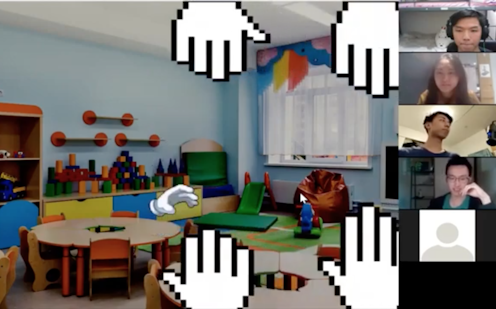Virtual hackathons can help you solve coronavirus problems without leaving your home
- Written by Geoffrey Mann, Sessional Lecturer, RMIT University

If you want to solve a problem quickly it helps to get many minds working together to find a solution, and that’s what happens in a hackathon.
It usually involves teams of people working over a short period of time to brainstorm an idea. But that’s not possible with the current advice to avoid gatherings thanks to the coronavirus pandemic.
That hasn’t stopped people embracing hackathons, this time to help solve some of the problems the pandemic itself has created. Instead of face-to-face meet-ups, though, people are doing them online in virtual hackathons.
In these times of uncertainty, people are trying to embrace creativity, innovation and collaboration to develop and implement solutions to the challenges of COVID-19.
How does a hackathon work?
A typical hackathon usually starts with describing a problem, sketching a possible solution to that problem, designing that solution and then launching a prototype.
All this usually takes place over 24 to 48 hours.
At the end you will be exhausted. But you will have worked with a very diverse team to conceive, build and refine a working solution that hopefully can address a significant problem in society.
Some people assume you need to be a software engineer to participate in the hackathon. This couldn’t be further from the truth. Techstars is an organisation that helps start-up companies and it has organised a coronavirus virtual hackathon calling on people including:
Developers, designers, marketers, nurses, doctors, students, scientists, teachers — anyone with an idea to tackle the challenges created by the global pandemic [is] welcome.
This is possible because virtual hackathons are creating an open online environment where people from around the world can apply their particular skill sets in a diverse team to solve a global problem in a short time.
A global effort
Garage48 is an organisation that helps set up hackathons. It says it has already helped more than 55 hackathons around the world that are trying to solve the global crisis of COVID-19.
Some of the most notable include:
Global Hack: this global hackathon had more than 12,000 participants from 100 countries. They worked on 500 life-changing projects including mental health, environment, governance and remote education solutions during COVID-19.
The winning team developed a solar-powered solution for accessible, affordable and barrier-free access to hand disinfection.
And the winner is: SunCrafter – solar-powered light disinfection.MIT COVID-19 Challenge: this global hackathon had more than 1,500 participants from 90 countries. They worked on 238 solutions for issues such as education online, food availability and emergency responses during COVID-19.
One of the winning teams’ solution was to build a tele-health platform to allow the monitoring of vital signs such as heart rate and blood oxygen of patients at home to help ease pressure on hospital admissions.
Teams Australia
While some of these global hackathons are open to Australians, it doesn’t mean Australians can only participate in overseas hackathons. We have them here as well.
ACS Flatten the Curve Hack: the Australian Computer Society had more than 2,000 participants brainstorming over 48 hours to solve remote education, health system, future of work and mental health challenges during COVID-19.
One of the finalists was a team that built a computer game as a way to help children better understand COVID-19.
A finalist.One of the reasons for the increase in virtual hackathons is that it is easy for people to participate online thanks to the technology underpinning them.
They incorporate a range of online tools and apps, such as Slack, Microsoft Teams and Discord, as the communication platforms between team members around the world.
They also use Microsoft’s One Drive and Google Drive to share documents and files between team members.
Then using video-conferencing technology such as Zoom and Skype the teams can present the finalist to everyone around the world.
Your help is needed
Taking part in hackathons has a number of benefits, from financial awards to mentorship to turn a team’s prototype into a possible profitable firm.
Beyond these rewards, the COVID-19 hackathons empower everyday people with the opportunity to implement in a short time a solution to a problem that is impacting everyone’s family members and friends.
Signing up to virtual hackathons is as easy as signing up to Netflix. All you need to do is find the hackathon that is addressing a problem you are interested in and sign up.
You do not even need to prepare team members beforehand, as you will find team members during the hackathon who will become new friends by the end of the competition.
Authors: Geoffrey Mann, Sessional Lecturer, RMIT University





